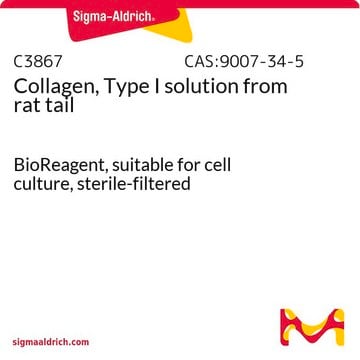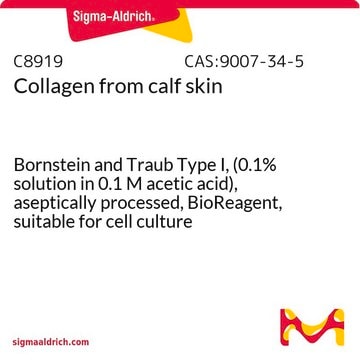L7220
Collagen A
Sinónimos:
Collagen A
About This Item
Productos recomendados
origen biológico
bovine (calf) skin
Formulario
liquid
envase
pkg of 6 x 5 mL ×
concentración
1 mg/mL
técnicas
cell culture | mammalian: suitable
Condiciones de envío
ambient
temp. de almacenamiento
2-8°C
¿Está buscando productos similares? Visita Guía de comparación de productos
Descripción general
Nota de preparación
The Collagen molecules remain monomeric in solution at a pH below 3.8 and lower ion concentration, there is no fibril formation.
We recommend two different coating systems, depending on when you need the culture flasks: either for immediate use after production or after a longer storage period.
To use the culture flask immediately:
- Mix 1 ml Collagen A (cat. no. L7220) with an equal volume of ultra-pure water or with 1x PBS, adjusted to a pH of 3.0 - 3.5. The PBS solution (cat. no. L1815) is adjusted to a pH of 3.0 - 3.5 as follows: Add 1 ml 1 N HCl to 100 ml PBS solution.
- Add 2 ml of the diluted Collagen solution per 10 cm2 area of culture flask and incubate for 2 - 3 hours or overnight at room temperature (≤+25°C) (alternatively for 30 min at +35 - +37°C). Remove solution and wash with ultra-pure water or with 1x PBS (pH approx. 7.3). Use the culture flask immediately.
To store culture flasks for a longer period:
- Mix 1 ml Collagen A with an equal volume of ultra-pure water.
- Add 2 ml of the diluted Collagen solution per 10 cm2 area of culture flask or 20+D1 μl per well of a microtitre plate.
- Incubate overnight at room temperature (≤ +25°C) in the air stream of a Laminar-Airflow system and let the coating solution dry to form a collagen film. The culture flasks can be stored sterile packed until use (cool, dry storage). Before use, rinse briefly with culture medium.
2. Coating culture flasks with fibrillar Collagen A
Collagen fibril formation is carried out at a pH above 4.0, in particular at physiological pH 7.0 - 8.0, at physiological ion concentration and warming to a maximum +37°C.
We recommend two different coating systems for fibrillar Collagen A, depending on when you need the culture flasks: either for immediate use after production or after a longer storage period.
To produce the neutralised Collagen solution cool all the solutions in an ice-water bath at approx. +2 - +8°C and mix.
To use the culture flask immediately:
- Mix 2 ml Collagen A with 0.2 ml PBS solution (10x).
- Adjust the pH to pH 7.3 ± 0.2 by adding approx. 10 μl 1 N NaOH.
- Add 2 ml of solution per 10 cm2 area of culture flask and incubate for at least 3 hours or overnight at room temperature (≤ +25°C) (alternatively for at least 60 min at +35 - +37°C).
- Remove solution and wash with 1x PBS (pH approx. 7.3) or with nutrient solution. Use the culture flask immediately.
To store culture flasks for a longer period:
- Mix 1 ml Collagen A with an equal volume of 0.3 M NaCl solution and with 1 N NaOH solution, adjust to a pH of 7.0 - 8.0.
- Add 2 ml of the diluted Collagen solution per 10 cm2 area of culture flask or 20 μl per well of a microtitre plate.
- Incubate overnight at room temperature (≤ +25°C) in the air stream of a Laminar-Airflow system and let the coating solution dry. The culture flasks can be stored sterile packed until use (cool, dry storage). Before use, rinse briefly with culture medium.
Otras notas
Cell Attachment: Pass
pH: 1.8-2.4
Osmolality: 0.01-0.05 Osm/kg H20
Collagen Content: 0.09-0.15%
Hydroxyproline: 0.012-0.019%
Color: Colorless
Appearance: Clear
Código de clase de almacenamiento
12 - Non Combustible Liquids
Clase de riesgo para el agua (WGK)
nwg
Punto de inflamabilidad (°F)
Not applicable
Punto de inflamabilidad (°C)
Not applicable
Elija entre una de las versiones más recientes:
Certificados de análisis (COA)
¿No ve la versión correcta?
Si necesita una versión concreta, puede buscar un certificado específico por el número de lote.
¿Ya tiene este producto?
Encuentre la documentación para los productos que ha comprado recientemente en la Biblioteca de documentos.
Active Filters
Nuestro equipo de científicos tiene experiencia en todas las áreas de investigación: Ciencias de la vida, Ciencia de los materiales, Síntesis química, Cromatografía, Analítica y muchas otras.
Póngase en contacto con el Servicio técnico








